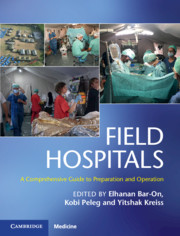Book contents
- Field Hospitals
- Field Hospitals
- Copyright page
- Contents
- Contributors
- Preface
- Section 1 History
- Section 2 Scenarios
- Section 3 Operational Considerations
- Chapter 6 Training and Accreditation
- Chapter 7 Personnel
- Chapter 8 Leading the Mission
- Chapter 9 Coordination and Organization of Medical Relief to Affected Areas
- Chapter 10 Field Hospital Logistics
- Chapter 11 Auxiliary Medical Services in a Field Hospital
- Chapter 12 Information and Communication Technologies in a Field Hospital
- Section 4 Clinical Considerations
- Section 5 Additional Contextual Considerations
- Index
- Plate Section (PDF Only)
- References
Chapter 10 - Field Hospital Logistics
The Technical Component
from Section 3 - Operational Considerations
Published online by Cambridge University Press: 09 January 2020
- Field Hospitals
- Field Hospitals
- Copyright page
- Contents
- Contributors
- Preface
- Section 1 History
- Section 2 Scenarios
- Section 3 Operational Considerations
- Chapter 6 Training and Accreditation
- Chapter 7 Personnel
- Chapter 8 Leading the Mission
- Chapter 9 Coordination and Organization of Medical Relief to Affected Areas
- Chapter 10 Field Hospital Logistics
- Chapter 11 Auxiliary Medical Services in a Field Hospital
- Chapter 12 Information and Communication Technologies in a Field Hospital
- Section 4 Clinical Considerations
- Section 5 Additional Contextual Considerations
- Index
- Plate Section (PDF Only)
- References
Summary
According to the World Heath Organization's (WHO) EMT initiative, teams must meet an agreed set of standards, both clinically and logistically. EMTs must be self-sustainable and not create a burden on the already stretched resources of a host nation.
The technical demands of field hospitals require logistical personnel with specialist skills, which ensures a field hospital can continue to function when all around them has been destroyed. They must be multiskilled to fulfill multiple roles within the team.
A collection of tents does not constitute a field hospital: methodical planning around safety and security, patient flow, and overall functionality is a necessity. Field hospitals require large volumes of clean water that meets or exceeds the WHO standards of potable water; consequently, EMTs must understand the requirements of self sustainability, water quality, and quantities for the delivery of services they are offering. WASH requires an expertise and the capacity and capability to deliver high levels of WASH irrespective of the circumstances. Leading by example in health care to other health-care personnel and facilities is a essential criteria of an EMT: technical logistics is key to achieving this.
Keywords
- Type
- Chapter
- Information
- Field HospitalsA Comprehensive Guide to Preparation and Operation, pp. 80 - 87Publisher: Cambridge University PressPrint publication year: 2020



